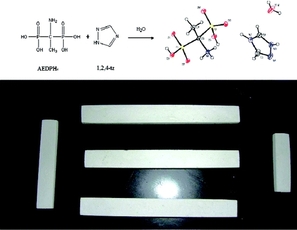Feb 11 2009
Scientists in China are reporting development and testing of new self-sanitizing plaster with more powerful antibacterial effects than penicillin. The material could be used in wall coatings, paints, art works and other products. The study is in the current issue of ACS' Crystal Growth & Design, a bi-monthly journal.
 Scientists report development of a novel plaster with excellent sterilizing abilities and properties similar to traditional gypsum plaster. American Chemical Society
Scientists report development of a novel plaster with excellent sterilizing abilities and properties similar to traditional gypsum plaster. American Chemical Society
Liang-jie Yuan and colleagues note that plaster has been used for centuries as building material and surfaces for great works of art, including Michelangelo’s famed Sistine Chapel ceiling in Vatican City. The new, first-of-its kind plaster —formed from different ingredients from traditional gypsum plaster — still retains similar mechanical properties while having added antibacterial effects.
Lab tests showed that the so-called “supramolecular” plaster has a “very broad” antibacterial spectrum, killing five types of disease-causing bacteria. When compared with penicillin, the plaster was more effective at controlling growth of four kinds of bacteria, including dangerous Staphylococcus aureus and Escherichia coli. “It can be expected that the supramolecular plaster can be used for building, painting, coating and carving, and the coat, brick, or art ware constructed by the plaster do not need additive antiseptic or sterilization,” the authors say